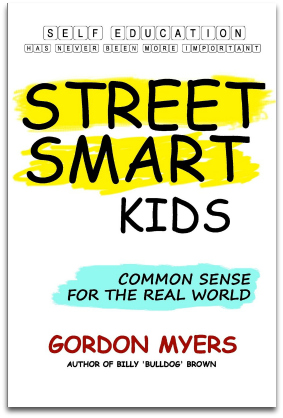by Chonce Maddox.
(This article is part of the Emotional Intelligence series.)
 Are your children equipped to manage and make decisions when you aren’t present?
Are your children equipped to manage and make decisions when you aren’t present?
When my son was 4-years-old last year and we had a small fire in the kitchen, I wondered the same thing.
I was at home with him of course but when his dad was busy trying to put the fire out and I was anxious to remove my son from the house, he froze and didn’t know what to do.
At first he ran back to his room to turn the television off!
Then he just looked confused and scared when I asked him repeatedly to put his coat and shoes on and step outside.
When I finally got him outside and to safety, we put the fire out and I suddenly felt like a horrible parent. We never even practiced fire drills at home, I thought to myself. If we had, maybe he would’ve known not to run back into his room and turn things off; he would have just ran for the door, I chastised myself.
But I don’t think we’re very different from other parents. Like most parents I know, I spent most of my time helping my preschooler learn the alphabet and how to spell his name. On a good day when everything was fine, practicing fire drills at home doesn’t normally cross your mind.
Yet, teaching them some of these “other” things is important.
As parents, we won’t be by our child’s side 24/7 – so, it is is crucial that we teach them how to be street smart. It’s just as important to teach them how to behave and interact with the world around them as it is to teach them how to excel academically.
 In the book Street Smart Kids: Common Sense for the Real World, author Gordon Meyers talks about how people who are street smart develop a keen sense of situation awareness that affords them a distinct advantage over others as they steer through life, and it all starts at a very young age.
In the book Street Smart Kids: Common Sense for the Real World, author Gordon Meyers talks about how people who are street smart develop a keen sense of situation awareness that affords them a distinct advantage over others as they steer through life, and it all starts at a very young age.
Meyers also discusses how the fundamentals of learning how to fend for oneself using street smarts are mostly the same despite which type of environment kids grow up in. He believes that adults and parents have the knowledge and are in a place of power to help kids become street smart by sharing helpful tips along with their experiences and life lessons learned.
“As a coach, I was amazed at the profound effect that a little caring could have on one person, young and older alike,” Meyers said when I asked him what prompted him to write Street Smart Kids.
“The most important takeaway is that every individual is ultimately accountable for whatever happens to them in their lives. Making important and sometimes hasty decisions are quite difficult but some of them have an everlasting effect so it’s important to utilize street smarts to your benefit,” Meyers added.
As a parent, my worst fear is that I won’t be able to protect my child when he needs it. My second worst fear is that he won’t be able to protect himself and make wise decisions depending on what situation he’s in.
Helping my child become street smart solves both of these issues and helps eliminate the fear and uncertainty I once had.
Inhabitots, a baby and parenting focused resource, uses research from the Nemours Foundation to support the fact that street smart kids are far less likely to be abducted than sheltered kids. Thus, it’s in parents’ best interest to raise street smart kids who can help keep themselves safe from strangers, identify safe places in the neighborhood, and navigate their way around new places to make it through tough situations.
 Acquiring street smart characteristics is something we often hear about from previous generations since the concept of ‘street smarts’ dates back several decades. You’ve probably heard your parents or grandparents mention the term and it is just as important that you introduce it to your children and pass down your street smart knowledge.
Acquiring street smart characteristics is something we often hear about from previous generations since the concept of ‘street smarts’ dates back several decades. You’ve probably heard your parents or grandparents mention the term and it is just as important that you introduce it to your children and pass down your street smart knowledge.
Growing up I always thought of my dad as the epitome of a street smart person and come to find out, he developed his sense of situational awareness (not to mention common sense) as a child. My dad learned from the school of hard knocks when his father dropped him off in the downtown area of Chicago and challenged him to find his way back home on his own.
This was in the ‘60s mind you, and a little tough in my opinion. It’s certainly something I would never do to my child today but my dad accepted the challenge and returned home in one piece.
Ever since then, he’s become a reliable human map of the city and it’s almost impossible for him to get lost. He literally knows every nook and cranny throughout the entire city including the suburbs of Chicago. There’s not a street or area he doesn’t know about and if I ever needed help or directions all I’d have to do is call him and he’d know where I was. It’s very impressive.
He taught me how to be observant of my surroundings at all times. It’s a valuable trait that can not only help ensure my safety but the safety of my child as well.
From teaching your kids the basics about not talking to strangers and avoiding dark abandoned alleys at night to equipping them with navigational skills and wise personal instincts, there are plenty of effective ways we can help our children become street smart as they grow up.
 Read them books about the world around them.
Read them books about the world around them. Encourage kids to stay, play, and travel with a group of friends.
Encourage kids to stay, play, and travel with a group of friends. Give your kids tips for how to use their best judgement and avoid spending time with questionable people.
Give your kids tips for how to use their best judgement and avoid spending time with questionable people. Warn your teens about choosing their friends wisely. Association brings assimilation.
Warn your teens about choosing their friends wisely. Association brings assimilation.I’m grateful that my mom never sheltered my older sister and me when we were growing up. When we were old enough to know something and learn about an experience she had, she didn’t hold back from telling us. In turn, it made us wiser, more observant, and able to confidently make the right choices.
Sheltering kids too much just puts them in an unrealistic bubble and doesn’t prepare them to deal with various different situations when they occur. I fondly remember car rides that were spent going over safety tips and experiences that my mom encountered.
Now that I’m a mom, I use car rides to converse with my son about experiences and ideas that he can grasp at his age. I point out the police station when we pass it, safe places and unsafe places, and familiar landmarks in the area. When it comes to your child learning how to become street smart, you are that link between home life and the real world. Grab the every day teaching opportunities every chance you can!
Ask yourself: What does my child know how to do well? Does he or she pay attention to the world around them? What situations can they handle without my guidance? What situations do they need to learn how to handle if I’m not present?
Have a serious but friendly sit-down conversation with your child. Introduce the concept of being street smart and communicate its importance.
Make sure they are comfortable calling 911 in the case of an emergency and know their phone number. If your child is older, teach them the phone number of a trusted friend who can help in an emergency.
Practice setting up routines that will help your children manage when unexpected events and situations occur. Organize a fire drill and a tornado drill routine to start and identify safe places in the home. Then develop a plan with your child that will help them know what to do if you were ever separated from each other in a public area.
Train your kids how to be aware of their surroundings when they are away from you and give them a tour of your area and neighboring towns so they can become familiar with the setting.
Since being street smart is all about using the experiences and knowledge you have to make sound decisions for yourself, equip them with life experiences, insight and knowledge by getting out and exploring your surroundings together.
About Chonce Maddox:
Chonce is a freelance writer for hire, personal finance blogger, and mother to a spunky preschooler. She’s a passionate storyteller and you can visit her blog, mydebtepiphany.com or follow her on Twitter @mydebtepiphany.
“Dr. Amy knows how to relate to children and make them feel comfortable. My son was shy in the beginning but Amy asked him a couple of questions about what he likes and immediately found a connection with him. He happily followed her into the office (just after a 3 min of conversation) and performed the test. He wasn’t nervous or scared and it’s because of her ability to relate to kids.
We had a great experience and he wants to go back! Thank you very much!”
— Dad of 5-year-old assessment client“Supporting the mental health of the kids and teens in our community is one of the most challenging and also one of the most important jobs anyone could have. And I see your team doing it with both skill and enthusiasm.Our family could not be more fortunate to have found your practice 3 years ago.
Our kids are growing up but we still keep your number on our phone and we know we can reach out to your team if we need it. We tell everyone who asks about the WISE people at The Wise Family.
Thank you for doing what you do for so many people.”—from the parent of two former clients (siblings)
— Parent of two former clients (siblings)“Our clinician has been a tremendous help with family issues and getting our children organized for success in life. Highly recommend her.”
— Mom of three young adults ages 20 – 24“Thank you so much for all you do and care for me. And all the work you do for my family. I {heart} you.”
— 10-year-old coaching client